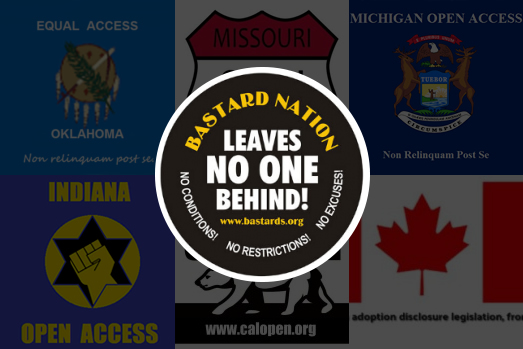Resolution of the Executive Committee of Bastard Nation on A National Voluntary Mutual Consent Registry
On June 11th 1998 the U.S House of Representative Ways and Means Committee (subcommittee on Human Resources) held hearings to hear testimony on an adoption reunion registry bill. This bill passed the Senate, (S.1487), which it has done several times in the past, and was being considered in the House. (Note: S.1487 since died in the House.)
Only invited guests may testify at the hearing, but anyone may submit a written statement to be distributed to the press and hearing attendees, and submitted into the record of the hearing for consideration by committee members. Bastard Nation wrote the following statement and sent it airmail to arrive in time for the hearing. Please feel free to distribute this statement to other lists.
REGARDING: June 11th Hearing of the U.S House of Representatives Ways and Means Committee, SubCommittee on Human Resources, Adoption Reunion Registry bill.
Bastard Nation, the world’s largest adoptee activist organization, has concerns about the establishment of a federal voluntary mutual consent reunion registry. While we applaud the fact that the federal government is focusing on the inherent injustice of sealed adoption records, we are dismayed that the House Ways and Means Committee appears to be operating under certain erroneous assumptions.
In its statement to the press regarding today’s hearing on the establishment of a federal adoption reunion registry, the Committee states, “Under most State laws, when an adoption takes place, the records providing information about the birthparents and circumstances surrounding the birth are sealed to protect the confidentiality of all the parties: the birthparents, the child, and the adoptive parents.” This is simply untrue. Records were not sealed in most states until the mid 1940’s, and even then the process was not intended to hide the identity of the birthparents from the adoptee, but rather to keep the proceedings confidential from the public, or other uninvolved third parties. Unfortunately, the original intent of the sealed record has been forgotten or distorted. Instead, a state-supported system of secrets and lies developed which has legally held hostage the birth records of adopted people.
Some opponents of open records claim that sealed records protect the “rights” of birthparents to confidentiality, yet recent federal court rulings have determined that there could be no guarantees of confidentiality to birthparents and that birthparents have no right to anonymity from their offspring. (Doe v. Sundquist)
As adoptees, we can walk into city, county, and state offices and read and copy a legion of public documents dealing with the most private aspects of the lives of total strangers. We can read and access wills, tax receipts, deeds, marriage license applications, birth and death certificates, police reports, divorce decrees, and even autopsy reports. On the state level for a nominal fee, we can order DMV registration reports and driving records. We can call up the Secretary of State’s office and right over the phone learn who incorporated a business when they did it, and what kind of money they put up. But we cannot access our own birth certificates.
We believe that the formation of a reunion registry might be appropriate if adoptees were already able to obtain their original birth certificates in the same manner as the rest of the American population. But reunion registries are not substitutes for righting the wrong of sealed records, and the issue of opening sealed records should not be confused with search and reunion. Access to one’s birth document is nothing less than a civil right. Measures which aid in reunions do nothing to remedy the violation of this right caused by the denial of access. Searching and non-searching adoptees alike want and deserve the same rights as all other adult U.S. citizens.
Regardless of the outcome of the adoption reunion registry bill, we hope the committee will continue to examine sealed adoption records in the United States, which is one of the last nations in the industrialized world to still utilize such a system, based on archaic notions of “illegitimacy” and shame. We believe that any such examination will cause reasonable people to conclude that keeping birth certificates sealed from the people for whom they were issued, ultimately harms adoption in its entirety by perpetuating an unhealthy climate of secrets, shame and lies.
Bastard Nation Executive Committee
June 10, 1998




